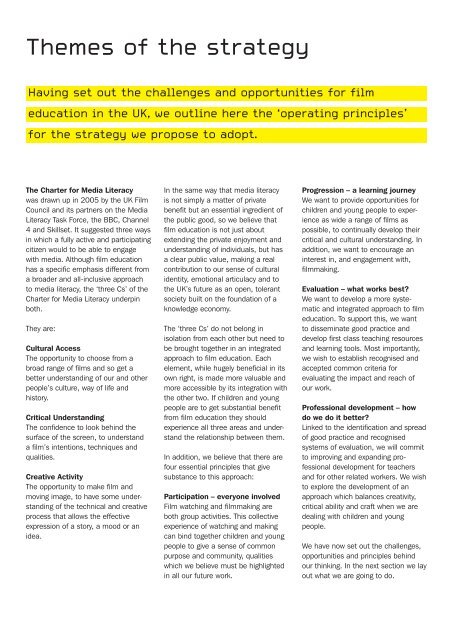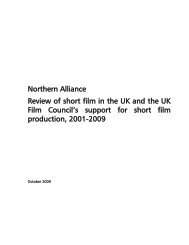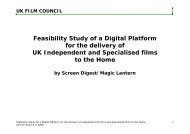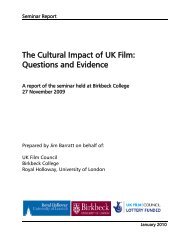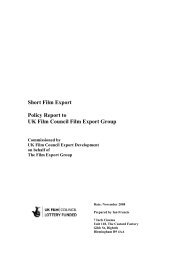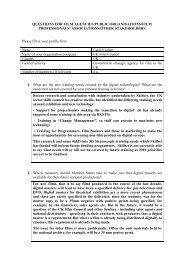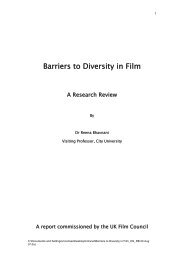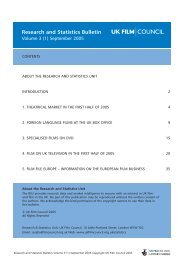FILM: 21ST CENTURY LITERACY - BFI
FILM: 21ST CENTURY LITERACY - BFI
FILM: 21ST CENTURY LITERACY - BFI
Create successful ePaper yourself
Turn your PDF publications into a flip-book with our unique Google optimized e-Paper software.
Themes of the strategy<br />
Having set out the challenges and opportunities for film<br />
education in the UK, we outline here the ‘operating principles’<br />
for the strategy we propose to adopt.<br />
The Charter for Media Literacy<br />
was drawn up in 2005 by the UK Film<br />
Council and its partners on the Media<br />
Literacy Task Force, the BBC, Channel<br />
4 and Skillset. It suggested three ways<br />
in which a fully active and participating<br />
citizen would to be able to engage<br />
with media. Although film education<br />
has a specific emphasis different from<br />
a broader and all-inclusive approach<br />
to media literacy, the ‘three Cs’ of the<br />
Charter for Media Literacy underpin<br />
both.<br />
They are:<br />
Cultural Access<br />
The opportunity to choose from a<br />
broad range of films and so get a<br />
better understanding of our and other<br />
people’s culture, way of life and<br />
history.<br />
Critical Understanding<br />
The confidence to look behind the<br />
surface of the screen, to understand<br />
a film’s intentions, techniques and<br />
qualities.<br />
Creative Activity<br />
The opportunity to make film and<br />
moving image, to have some understanding<br />
of the technical and creative<br />
process that allows the effective<br />
expression of a story, a mood or an<br />
idea.<br />
In the same way that media literacy<br />
is not simply a matter of private<br />
benefit but an essential ingredient of<br />
the public good, so we believe that<br />
film education is not just about<br />
extending the private enjoyment and<br />
understanding of individuals, but has<br />
a clear public value, making a real<br />
contribution to our sense of cultural<br />
identity, emotional articulacy and to<br />
the UK’s future as an open, tolerant<br />
society built on the foundation of a<br />
knowledge economy.<br />
The ‘three Cs’ do not belong in<br />
isolation from each other but need to<br />
be brought together in an integrated<br />
approach to film education. Each<br />
element, while hugely beneficial in its<br />
own right, is made more valuable and<br />
more accessible by its integration with<br />
the other two. If children and young<br />
people are to get substantial benefit<br />
from film education they should<br />
experience all three areas and understand<br />
the relationship between them.<br />
In addition, we believe that there are<br />
four essential principles that give<br />
substance to this approach:<br />
Participation – everyone involved<br />
Film watching and filmmaking are<br />
both group activities. This collective<br />
experience of watching and making<br />
can bind together children and young<br />
people to give a sense of common<br />
purpose and community, qualities<br />
which we believe must be highlighted<br />
in all our future work.<br />
Progression – a learning journey<br />
We want to provide opportunities for<br />
children and young people to experience<br />
as wide a range of films as<br />
possible, to continually develop their<br />
critical and cultural understanding. In<br />
addition, we want to encourage an<br />
interest in, and engagement with,<br />
filmmaking.<br />
Evaluation – what works best?<br />
We want to develop a more systematic<br />
and integrated approach to film<br />
education. To support this, we want<br />
to disseminate good practice and<br />
develop first class teaching resources<br />
and learning tools. Most importantly,<br />
we wish to establish recognised and<br />
accepted common criteria for<br />
evaluating the impact and reach of<br />
our work.<br />
Professional development – how<br />
do we do it better?<br />
Linked to the identification and spread<br />
of good practice and recognised<br />
systems of evaluation, we will commit<br />
to improving and expanding professional<br />
development for teachers<br />
and for other related workers. We wish<br />
to explore the development of an<br />
approach which balances creativity,<br />
critical ability and craft when we are<br />
dealing with children and young<br />
people.<br />
We have now set out the challenges,<br />
opportunities and principles behind<br />
our thinking. In the next section we lay<br />
out what we are going to do.


